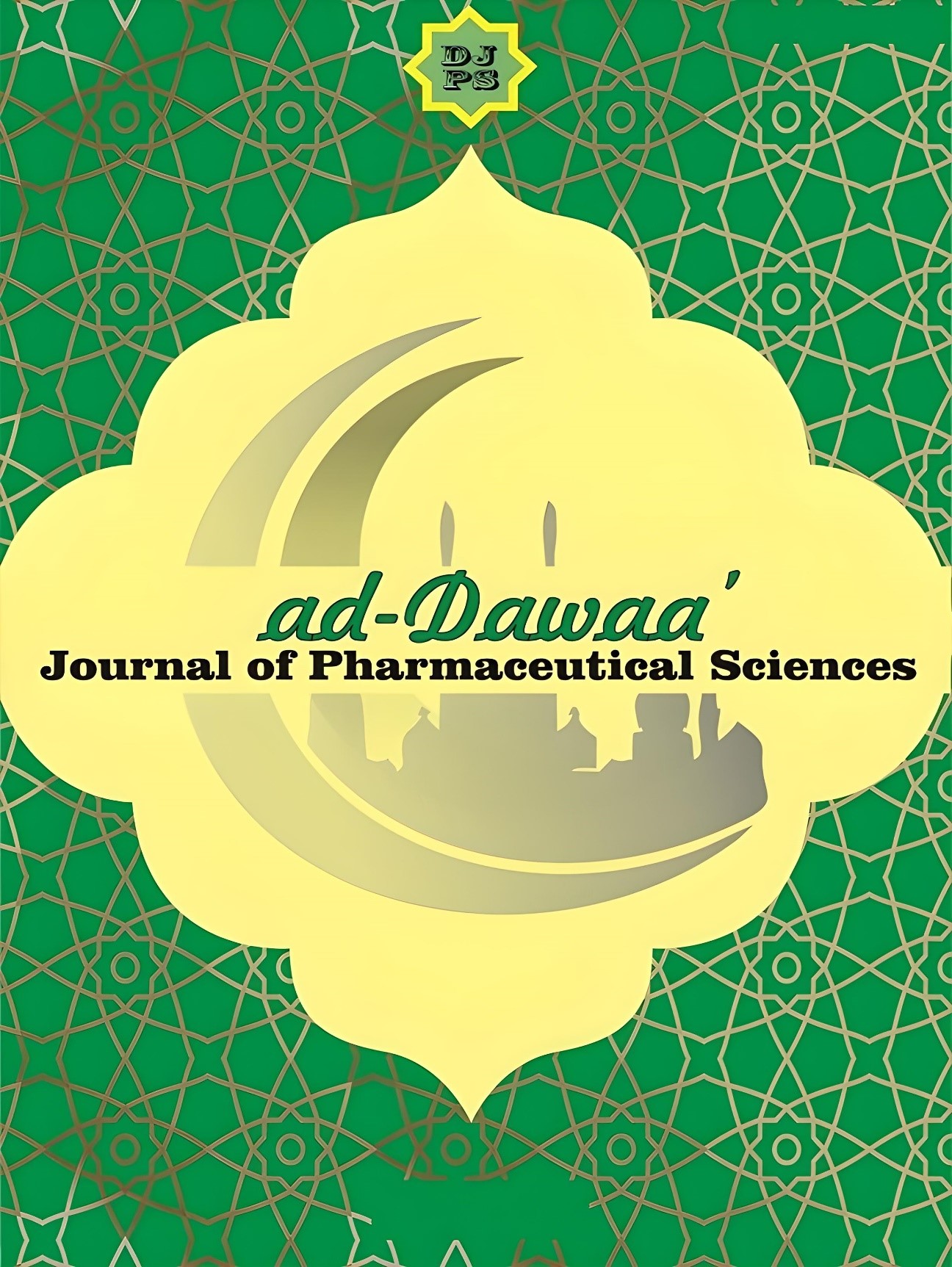Toxicity and Alpha Glucosidase Inhibitory Activity of Roasted Kedawung Seed (Parkia timoriana)
DOI:
https://doi.org/10.24252/djps.v8i1.57945Keywords:
Roasted, P. timoriana , toxicity, alpha glucosidase , BSLTAbstract
Introduction: Kedawung (P. timoriana) seeds are empirically utilised as a traditional medicine; it also contains various phytochemical compounds, antioxidant activities as well as other beneficial pharmacological effects. In some regions in Indonesia, the utilisation of kedawung seeds is usually done by involving the roasting process. Aims: This study aims to investigate the effect of roasting on phytochemical compounds, toxicity and alpha glucosidase inhibitory effects. Method: Kedawung seeds were roasted at 150 ºC (15 minutes); then separated from the skin, powdered and macerated in ethanol. Result: The extract was phytochemically screened with the results obtained showing positive for saponins, flavonoids, alkaloids, and terpenoids. The following test is toxicity test using BSLT (Brine Shrimp Lethality Test) method as well as inhibitory activity on alpha glucosidase enzyme. The test results showed that kedawung extract had an LC50 of 78.18 ppm in the BSLT test, as well as inhibition of alpha glucosidase enzyme at 265.24 ppm. Conclusion: The results obtained show that the ethanol extract of roasted kedawung seeds still has phytochemical metabolite compounds, but is moderately toxic and has weak inhibition on alpha glucosidase
Downloads
References
Adu, J. K., Amengor, C. D. K., Kabiri, N., Orman, E., Patamia, S. A. G., & Okrah, B. K. (2019). Validation of a Simple and Robust Liebermann–Burchard Colorimetric Method for the Assay of Cholesterol in Selected Milk Products in Ghana. International Journal of Food Science, 2019, 9045938. https://doi.org/10.1155/2019/9045938
Ajatta, M. A., Akinola, S. A., Otolowo, D. T., Awolu, O. O., Omoba, O. S., & Osundahunsi, O. F. (2019). Effect of Roasting on the Phytochemical Properties of Three Varieties of Marble Vine (Dioclea reflexa) Using Response Surface Methodology. Preventive Nutrition and Food Science, 24(4), 468–477. https://doi.org/10.3746/pnf.2019.24.4.468
Akmal, M., Patel, P., & Wadhwa, R. (2025). Alpha Glucosidase Inhibitors. In StatPearls. StatPearls Publishing. http://www.ncbi.nlm.nih.gov/books/NBK557848/
Angami, T., Bhagawati, R., Touthang, L., Makdoh, B., Nirmal, Lungmuana, Bharati, K. A., Silambarasan, R., & Ayyanar, M. (2018). Traditional Uses, Phytochemistry and Biological Activities of Parkia timoriana (DC.) Merr., an Underutilized Multipurpose Tree Bean: A review. Genetic Resources and Crop Evolution, 65(2), 679–692. https://doi.org/10.1007/s10722-017-0595-0
Aryan, S., Mortazavian, A. M., Mohammadi, F., Mahdavi, V., Moazami, N., & Jazaeri, S. (2022). Physicochemical Properties of Saponin Containing Acanthophyllum laxiusculum Extract: Example Application in Foam Stability and Qualitative Parameters for Malt Beverage Industry. Journal of Food Science and Technology, 59(4), 1577–
1587. https://doi.org/10.1007/s13197-021-05169-3
Athaillah, A., Lubis, R. M., Chandra, P., Pangondian, A., & Rambe, R. (2024). Uji Toksisitas Akut Ekstrak Rotan Sel (Daemonorop melanochaetes Bl.) Terhadap Larva Udang (Artemia salina Leach) dengan Metode Brine Shrimp Lethality Test (BSLT). Journal of Pharmaceutical and Sciences, 35–42. https://doi.org/10.36490/journal-jps.com.v7i1.463
Downloads
Published
How to Cite
Issue
Section
License
Copyright (c) 2025 Supandi Supandi, Ismanurrahman Hadi, Muhammad Ikhlas Arsul

This work is licensed under a Creative Commons Attribution-ShareAlike 4.0 International License.
Once an article was published in the journal, the author(s) are:
- granted to the journal right licensed under Creative Commons License Attribution that allows others to share the work with an acknowledgement of the work's authorship.
- permitted to publish their work online in third parties as it can lead to wider dissemination of the work.
- continue to be the copyright owner and allow the journal to publish the article with the CC BY-SA license
- receiving a DOI (Digital Object Identifier) of the work.







1.png)
